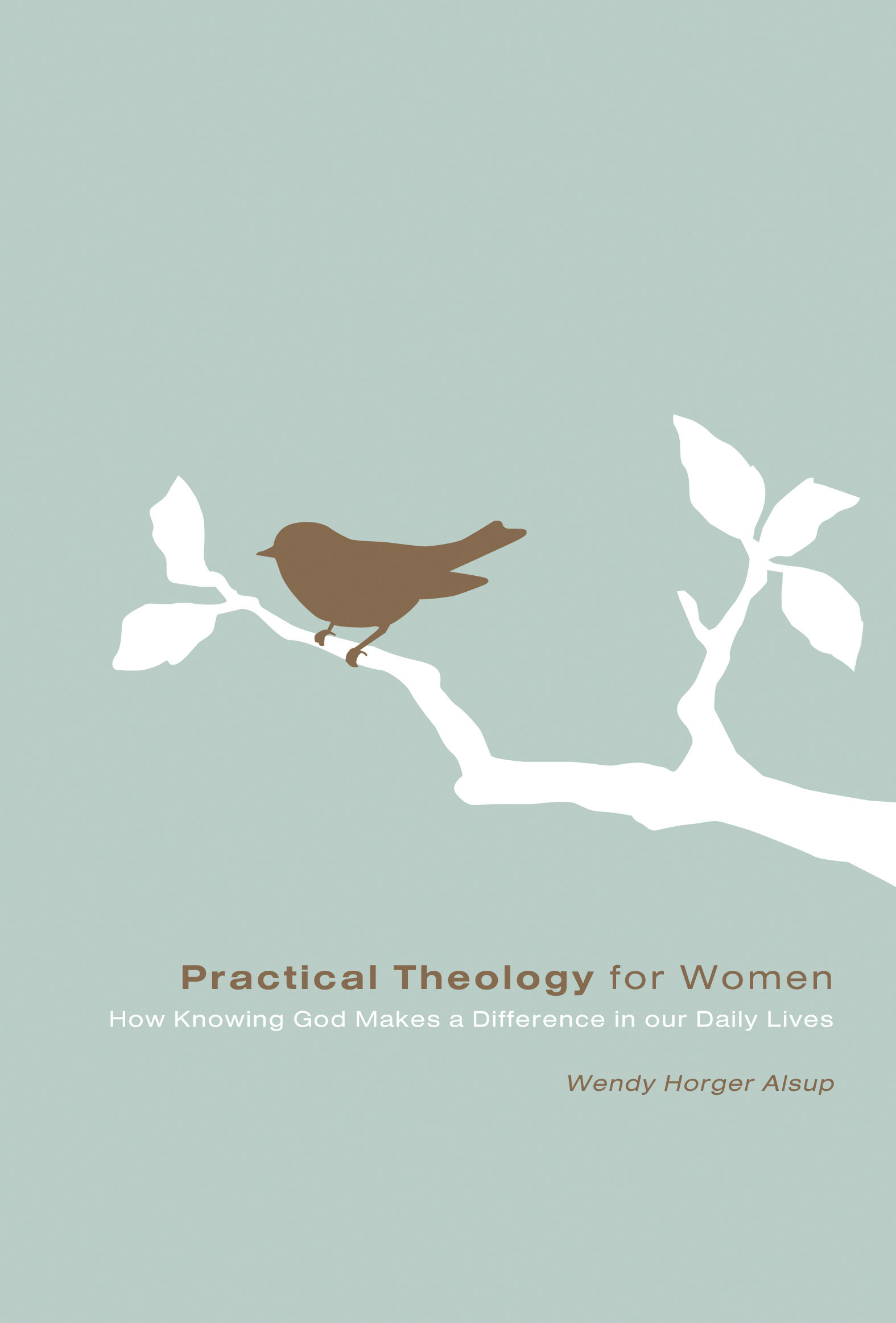 As I mentioned in another post, one book I'm greatly excited about is Wendy Horger Alsup's Practical Theology for Women: How Knowing God Makes a Difference in Our Daily Lives (Crossway, 2008). It's part of a series of short, practical books called Re:Lit from the saints at Mars Hill Church in Seattle, WA.
As I mentioned in another post, one book I'm greatly excited about is Wendy Horger Alsup's Practical Theology for Women: How Knowing God Makes a Difference in Our Daily Lives (Crossway, 2008). It's part of a series of short, practical books called Re:Lit from the saints at Mars Hill Church in Seattle, WA.I recount this story in the book, but several years ago, I heard a sermon at church that raised some questions about a particular doctrinal issue. I met a friend from another good church that afternoon and brought up the issue with her, curious to get her thoughts on it. She stopped me and said she only studies the Bible for practical application and avoids getting involved in discussions of doctrine and theology.
Around the same time, I visited a church on vacation that advertised a Practical Theology for Women class. Though I never attended the class, the title alone along with my conversation with my friend started me thinking—isn’t theology supposed to be practical? Is there really a divide between doctrine, theology, and the practical things of life? And what’s the point of doctrine and theology if it doesn’t matter in real life?
From there I began to develop a class at church that eventually became the foundation for the book. My desire has been to reach women who, first, think that theology is not for them and who, second, think theology is for them but who are put off by the technical jargon used by a lot of theologians. It’s frustrating that theologians often use language that is much more complicated than the actual concepts they are trying to communicate.
2) Why is your book specific to women? Doesn’t everyone need theology?
Certainly everyone needs theology—I just think women are underrepresented as target audiences of theological texts and the theological community in general. There are very few women’s books that emphasize theology. Most of the classes I’ve taught had a mainly female audience. Therefore that is where my particular burden is.
3) What is the difference in knowing God and knowing about God?
Well, I know about George Bush. I could list facts of his life. But I don’t know him. I don’t feel free to call him on the phone and bring my personal issues to him. And while I know facts about him, I don’t know him personally as a man like his wife and family do. I have been taught facts about God most of my life, but I had to understand the personal aspect of what Christ has purchased for me on the cross. The Bible says that now I can boldly enter God’s presence and bring my needs to him personally. God has invited me into something with Himself that transcends mere factual knowledge, but instead it’s a personal knowledge that changes me as I interact with him.
4) Some people are put off by the word theology. How would you define that term? What things tend to get in the way of people’s understanding of theology? How does Practical Theology for Women help to overcome these obstacles?
I use the term theology at its most basic level--simply the study of God. Biology is the study of life, zoology the study of animals, anthropology the study of man, and theology the study of God. Proverbs 9:10 says that the fear of the Lord is the beginning of wisdom and knowledge of the Holy One is understanding, so understanding the character of our God is essential to any hope for wise practical daily living. As I said before, I think one of the main things that get in the way of our understanding of theology is when authors use language that is essentially more complicated than the concepts we are attempting to communicate. I try in this book to teach the deep things of the Word in ways that are understandable and accessible to a breadth of educational backgrounds. If I do have to use a theological term (like sanctification or kenosis), I try to define the term clearly. So I try to do 2 things: communicate theology clearly and understandably, and then show why these theological issues matter to our daily lives as women.
5) You write, “Truly, there is nothing like a good grasp of accurate knowledge about God to enable you to meet the practical demands of your life—the practical demands of being a daughter, mother, wife, sister, or friend.” Can you explain this to our audience a bit? How does knowing God make a difference in our daily lives?
Well, regularly, I have to stop myself in the midst of whatever daily trauma I find myself and review what I know about God. And it ALWAYS makes a difference in how I view and respond to whatever big or small issue with which I’m dealing. We’ve had a couple of situations in the last few years that defy my ability to sort through and figure out on my own. I get stressed trying to control things that are fully out of my control. I have to stop my emotional roller coaster and think through God’s character. I know God is sovereign—He is in control. I know God is compassionate—He cares for His children with a love that defies our ability to explain. And I know God is wise—He knows what He’s doing. These attributes make all the difference when I am trying to make sense of circumstances out of my control. They don’t change my circumstances, but they change my perspective, which makes all the difference in the world.
6) You’ve been actively involved in women’s ministry for some time. What should the goal of a healthy women’s ministry be? Do you have concerns about the way that most evangelical churches practice women’s ministry?
Well, I think the goal of a healthy women’s ministry should be the same goal for every ministry at every stage of life—knowing God and understanding how that affects our daily life. Some women’s ministries and events attempt to deal with real women’s issues, which is great, but ignore the foundation of theology that equips us in each of those issues, which is very bad. You can’t understand what the Bible says about wives if you don’t understand Christ and his church. You can’t understand what the Bible says about parenting if you don’t get your adoption into God’s family and the inheritance you have as a co-heir of Jesus Christ. You can’t deal with infertility if you don’t understand the specifics of the trustworthy character of your God with an issue that tests women at the core of their being. So my burden is that we do both—deal with real issues but from the foundation of the character of God the Father, Son, and Spirit.
7) What thoughts and suggestions would you offer church leaders interested in strengthening the theological education of the women in their churches?
It would be disingenuous of me if I didn’t say I hope my book will be a stepping-stone for this very purpose. Beyond that, I suggest looking for women leaders who first and foremost understand grace. You can throw out spiritual terms all you want but still miss the foundation of the gospel, which is grace. From there, I suggest focusing on more Word driven rather than topic driven women’s studies. I love to see women’s classes or study groups going through Scripture itself rather than going through the latest fad in women’s books. That probably sounds odd from an author of a women’s book. But although I’ve written a book that I hope women will study, I know any power in my book isn’t from my words but from the Scripture presented there. Scripture digs so much more deeply more quickly into the heart of women’s issues than any women’s author could ever hope to do.
Ephesians is a great book for a women’s study. Going through Ephesians line-by-line is intensely valuable for a variety of things women face. Paul details our theology in chapters 1 through 3 and then shows in chapters 4 through 6 how that theology affects every aspect of our daily lives (as wives, moms, coworkers, in Christian community). The gospel of Luke is another great study for women. Getting Jesus’ example through out the book is core to understanding what it means to be conformed to His image. I Peter and Ruth are other good studies. I’d love to see women studying Scripture, asking themselves constantly, “What does this reveal to me about God?” Then, from there, I suggest following through by focusing on how that attribute of God makes a difference in how we should think about the circumstances affecting us right now.
I hope to write a study on Ephesians geared toward women for this very purpose.



